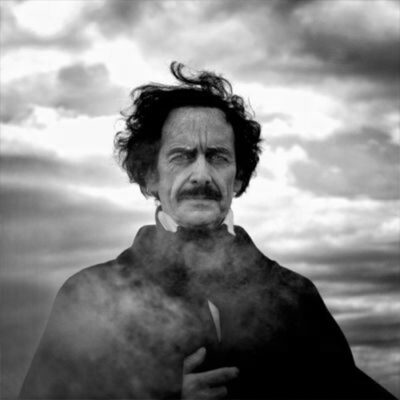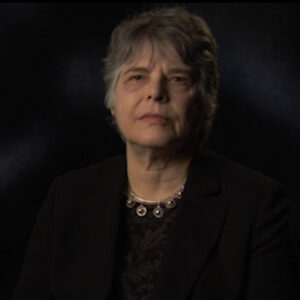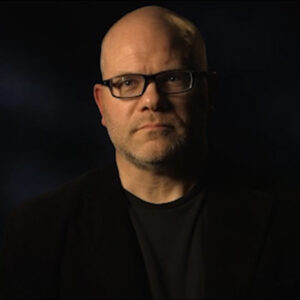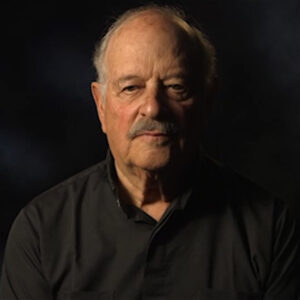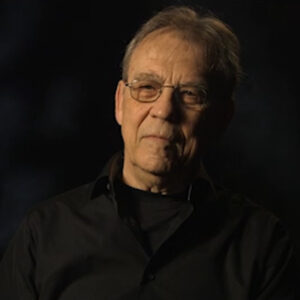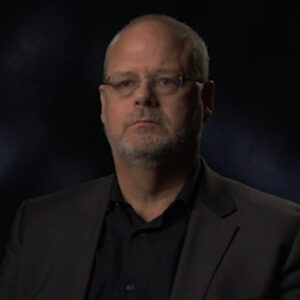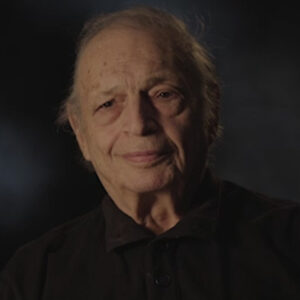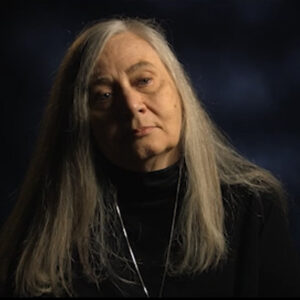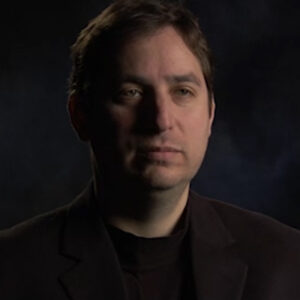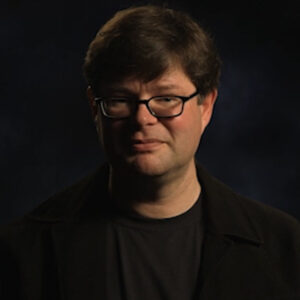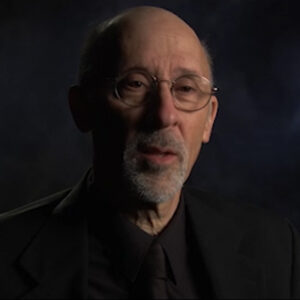Speaker OK, all right, um, let me start with just asking, what moved you to bring this to the screen? What drew you to that?
Speaker Well, I think what brought me to PO in the first place were Roger Corman’s movies, you know, when I was a teenager.
Speaker And, you know, I thought those they were amazing. And I wanted to find out more about this poor fellow. And I started reading his stories. And, you know, later I did a series of Lovecraft movies and we kind of emulated Corman’s pole movies and put it in where he put his name above the title. We did the same with Lovecraft and keep running into people now would say that it was my films that got them to read Lovecraft. So I kind of feel like the cycle continues.
Speaker Like what were the challenges or what are the challenges when you translate Poe for the screen?
Speaker Well, Paul, I think, is very filmic, you know, his very cinematic, you know, his his stories, you know, he always used to say that a story should be able to be told it is sitting without interruption. And I think movies are more like short stories and they’re like novels. And, you know, he’s his stories are all about the senses, you know. He talks about how things look and how they smell and how they taste and sound. And they really are very much like, you know, screenplays. So I think he’s, for the most part, very, very easy to adapt.
Speaker It’s really interesting, though, because when I read them and I’m sure other people, too, in some ways you feel like it’s there’s not very much specificity. There’s some details. But then other whole last things I left unmentioned, like where it’s happening or when it’s happening sometimes.
Speaker But he gets into things. I mean, one of my favorite things is in the pit and the pendulum, when the man is being sort of he’s in front of the tribunal and he can’t hear what they’re saying, he can just see their lips moving, which I think is very, very real. You know, that seems very real, that he’s in a state of shock almost.
Speaker And, you know, the idea you know, that idea is, I think, very cinematic, you know, not being able to hear the words, but just seeing the lips move and knowing that they’re condemning you to death. You know, a very powerful, great images.
Speaker And of course, people have written about and talked about how how much PO was delving into the unconscious psychological aspects of human existence before other writers were tackling that, or I think I mentioned to you that, you know, my my daughter invites me to come and speak to her high school classes.
Speaker She’s an English teacher about PO every usually around Halloween. And, you know, they had just read The Tell-Tale Heart. And one of the students asked me if I thought that it was possible that PO could be a serial killer because his you know, it’s written in the first person and his description of the sort of psychological, you know, what goes into the idea of someone, you know, murdering another person seems so real. And, you know, I think that’s that’s pretty extraordinary. You know, he does get into, you know, the minds of his characters and gets it across to you. And I love the fact that so much of his work, his stories are in the first person and his poetry as well. So it becomes very immediate. You know, there’s nothing about it that’s distancing. It’s just the opposite. It draws you in.
Speaker I’m following up on that, so he more than almost any other writer I can think of, gets confused, conflated, confounded with his story so that people, the general public thinks that, oh, is this opium addict? Not everyone, but a lot. Yeah. And then writers and filmmakers tend to turn him into the character in the story. Why is that YPO and not other authors.
Speaker Appose life was very much like one of his stories, I mean, you know, as a matter of fact, I think in some ways it’s even more intense than his stories are. You know, the whole idea that he was orphaned at the age of two, that his mother was and his father were actors and that he was adopted, you know, by this rich man in Richmond, Virginia, and, you know, taken to England to be educated and, you know, and then banished from the the family because he was getting into trouble, you know, college and, you know, the whole story about him and his teenage bride. You know, again, it’s all you know, it’s it’s more fantastical than his stories are. And, you know, what happened with her and her. And we got into it a little bit. And, you know, this adaptation of the Black Cat that we did, you know, that she used to love to sing to to guests, had a beautiful voice and starts, you know, spitting up blood one evening because a blood vessel has burst in her throat due to her consumption and and then watching her die and having to sit there, you know, and, you know, so much of you know, it’s just such a short life. You know, he dies at the age of 40 under mysterious circumstances. I mean, just his death alone is like it’s like a mystery story. So, you know, there’s just so much there in his in his personal life that is fascinating. And then he gave us these fantastic stories and these beautiful poems, which we all love. You know, I think the combination of it has made him the most popular American writer of all time.
Speaker Do you feel like there are misunderstandings among the general public about who he was, what his life was really like, whether whether in fact he was a denizen of the dark while he was slandered by this guy, Griswold, you know, who was his rival?
Speaker And it was Griswold who hated power, who wrote his obituary and sort of propagated a lot of these lies, you know, the idea that he was a drug addict and so forth, or that he had had an affair with his stepmother and things like that. And, you know, none of this was true. And people believed this for, you know, 100 years. And it wasn’t until pretty recently when they started delving into the facts of his life that they found that so much of this was, you know, just invented nonsense.
Speaker Going back to the the when you adapted it, what kind of guidelines or how did you like yourself and the writer you worked with to be guided by Poe? Because you did you had to put a lot around the edges.
Speaker We did. And, you know, the story is very short. You know, it’s I think probably 20 pages or so. So we needed to add some material to it. And what we decided to do this is Dennis Palely, who is the screenwriter and myself, was to focus on Poe’s story, takes place at the end of the Inquisition. And and the story ends with the front, you know, the French soldiers coming in and stopping the tortures.
Speaker And so, you know, we felt that it was rather than looking at the end of the Inquisition, it would be more interesting to look at the beginning.
Speaker And so we set the story in 1092, which was when Torquemada, with the help of Queen Isabella of Spain, started at all.
Speaker And we focused on him as a character. And, you know, the idea that the Grand Inquisitor falls in love, that was there was the idea that we added to the story, you know, in post story.
Speaker I mean, again, there are many things about his story that I think make it even better than our adaptation way better, which is that the man in the story never knows why he was arrested. He never knows what the crime was that he committed.
Speaker That ends up, you know, with him being, you know, tortured almost to death. And, you know, that I think was the case. And, you know, the reality of most of the victims of the Inquisition, they had to kind of guess why they had been arrested and why they were there.
Speaker And, you know, in doing the research on it all, you know, we found all these books on torture written by Torquemada and his rules for, you know, the torture and the different levels of torture. And we incorporated is as much of that into the movie as we could.
Speaker Do you want some water? Yeah, that sounds great, but I didn’t realize that he did.
Speaker He wrote several books and you know, they talk about it in the movie. You know, the idea the first level of torture is to be shown the implements of torture without being tortured. So you can kind of imagine what’s going to be done to you. And then, you know, the second level is watching someone else being tortured and then the third level that they begin to work on you and you’re never told what the crime is, you know, so you have to because they feel that it needs to come from within you.
Speaker You need to be able to confess honestly and, you know, without them, you know, kind of giving you the guide guidelines of any sort.
Speaker And I mean, a lot of the rules were just I mean, it’s like they’re almost funny sometimes. They’re, you know, they’re they’re so insane. It’s like Alice in Wonderland or, you know, you have no idea why you’re there and what is happening to you. You just know and they you can’t confess to avoid torture. You know, you have to be tortured. That’s one of the other roles. So when we found all of these you know this you know, these books that Torquemada had written and how he had made torture into kind of almost an art form, that was the most horrific thing of all, although at one point we found it was a schedule of a day in the life of a torturer at the during the Inquisition. And it was so matter of fact that it was really chilling. You know, it said something like, you know, you know, arrive at 7:00 in the morning, have breakfast, hang the whole lady up on a hook, you know, you know, take a break for lunch. You know, put the guy on the rack and stretch him. I mean, it just was like it just went on and on. And you sort of realized that how matter of fact, this all was for the people that were doing it and went on. The thing about the Inquisition that I hadn’t realized was it started in 1902.
Speaker And in post story, it ends it ends with Napoleon, you know, invading Spain, which is in 1800. So it goes on for 300 years or so. And during that time, you know, hundreds of thousands, maybe millions of people were tortured and killed.
Speaker What do you think how was after by writing a story like that?
Speaker That is what I think. I mean, some of it you have to remember that Poe is alive. You know, he was just sort of, you know, a young kid. But, you know, it’s sort of like, you know, for for me being born after World War Two and hearing all these stories about the war, you know, so he was hearing about the Inquisition when he was growing up. And there were all these tales about it. And I mean, one of them there was one story I found, which I think might have been something that he was aware of. It was an account of the. French soldiers coming to a Spanish castle and being, you know, looking around to see if there were, you know, prisoners there or if there was torture going on and the man who owns the castle says, oh, no, no, no, we don’t do those sorts of things here. You know, we never have and invites them to stay the night in the castle. And as they’re, you know, settling down to sleep, they start hearing these cries and moans and things coming from below the floorboards and they find a secret passageway down below. And there are all of these prisoners in dungeons underneath, you know, where they’re sleeping. And, you know, these are the kinds of stories that Poe was hearing about. These were in the newspapers, you know, as he was growing up. And I think, you know, that made a big impression on him. It also I should also add that one of the reasons that it did the movie was during the time, you know, Brian Usmani, who was the producer of Reanimator, were invited to the London Film Festival. And one of the days that we were there, we took a tour of the Tower of London. And as we were walking through it and looking at all of these, you know, torture devices and these are cells that these people were kept in that were so small that they couldn’t even stand up straight in the sense of, you know, the the horror that things that people really did to each other really, you know, hit us hard. And I think that’s what Paul is talking about here. It’s not anything, you know, supernatural here. This is real. This is reality. This is what we do. This is what people do. And when we were working on the movie, we got involved. We got help from Amnesty International and discovered that the torture devices that were used during the Inquisition are still being used, that that they haven’t really changed, you know, in all of these hundreds of years. So PO is dealing with something that is very real. And it was interesting. There was a book that I found about the Inquisition that had all of the various torture devices in it.
Speaker And the only one that was not in there was the pendulum that Poe describes in the story. So it sort of took all of these real things. And then I think he kind of let his own imagination take it a step further.
Speaker It’s really interesting, the crypts and the tunnels and the chambers and all of that in I mean, is it it’s of course scary and creepy. Is there more to it? Is there more are there sexual connotations there? What’s it about?
Speaker Well, I guess, you know, I mean, some of the ideas, like, you know, the sense and this is what’s great is so great about his stories is that he does make use of the senses. And the idea that, you know, one of the most powerful parts of that story is when he’s in total darkness, he can’t see anything and he’s moving around in the cell and he falls and he’s lying on the floor and he realizes that his head is lower than the rest of his body is, and then starts feeling the edges and discovers that there is this pit, this enormous pit in the center of the room, that if he had taken one more step, he would have fallen right into it.
Speaker And, you know, that idea of this, you know, is something that comes back to over and over again, the idea of this pit, of this whole, you know, the maelstrom. You know, the whirlpool is another one of his great stories and the idea of a sort of being sucked down into this into this pit, you know, of darkness and who knows what’s at the bottom of that pit. You know, it is a very, you know, powerful image.
Speaker And the claustrophobia that seems to come up so often and not wait for you want some more water? Yeah, we have another bottle of. Claustrophobia. Why does he evoke that so often and why was it so powerful or power?
Speaker You know, one of the images that comes up over and over again is the idea of being buried alive.
Speaker You know, you see that it’s a lot of his stories and, you know, the idea that you’re in this tiny, little confined coffin and, you know, you know, oftentimes buried below the ground and that you can’t get out. I mean, this is, you know, something that, you know, he deals with. It’s a recurring image.
Speaker Part of that, I think comes from the times that he lived in, which, you know, there was a real fear of that happening to people. And the thing that he talks about in the story, premature burial, about the little bell that is connected to a string that goes runs down to the inside of the coffin so that if you’re accidentally buried alive, you can pull the string and ring the bell. You know, that was something that they really did back then. And so I think it was a very real fear.
Speaker When you dealt with the black mayor at some point in the process, I guess kind of early on, you decided to make himself the central character.
Speaker Can you just talk about how you came to that decision?
Speaker Well, I think it really came out of for me during these talks to my daughter’s class about PO because I would talk about his life. And then at some point I would read one of his stories. And one year I did read The Black Cat, and it absolutely terrified the students. It was I hadn’t realized I’d forgotten how powerful that story is. And although it’s been adapted a million times for the screen, no one has ever really done it the way that Paul wrote it. It’s it’s a very disturbing story. I mean, involving, you know, maiming animals, you know, people, you know, torturing our pets. And, you know, that image is something that’s usually avoided when people adapt the story because it is so disturbing. And the main character in that story is a man with a drinking problem. You know, it says that he’s, you know, again, written in the first person. So it seems very much like it’s PO talking about himself, you know, and he had suffered from the same, you know, illness, really. And he.
Speaker It’s normally a very nice fellow, except when he has a few too many drinks and then he kind of becomes nasty and does these terrible things, and I thought, you know, and in that story, he mentions this idea, which I think is something that really informs a lot of people.
Speaker Who was he talks about the thing called the Imperva the perverse, which is the idea that just when everything is going really well, you have to do something to screw it all up. And Poe did that over and over again in his life.
Speaker And in this story, it’s you know, that’s kind of what he does to it. And he has to do these terrible things. It’s like you can’t help himself.
Speaker I need to change that. Tell me about the whole attraction.
Speaker I think that high school kids love. I know they do. And, you know, it’s one of those things like my daughter, who is a high school English teacher, is teaching a very kind of tough bunch of street kids this summer. And when, you know, she was having a very difficult time until she got to Poe and suddenly they were all about power, they were fascinated because they could relate to this guy.
Speaker This guy is weird and interesting and he’s romantic. You know, that’s the other thing about Poe is that there’s so much of his poetry and you know that it’s just so beautiful in tears at your heart. You know, things like Annabel Lee, so they understand him. And this whole idea of the empathy, the perverse, the idea that he has to mess everything up just when it’s going well. This is something every adolescent has done. It’s not just adolescents, but all of us who’ve done this. And it makes us love this man. And, you know, his stories are not boring. They’re exciting and scary and fun. And, you know, we just we want to find out everything we can about him.
Speaker And so can you talk a little more about his his enduring appeal that generation after generation?
Speaker Well, you know, what I think is interesting is that the attitude towards Poe seems to be changing. You know, there were a lot of people who thought that he was sort of kitschy.
Speaker You know, I think T.S. Eliot was one actually who sort of put him down. And I have this collection. It’s a sort of amazing that I you know, I’ve been doing things about going all the way back to the 1970s. And this is a collection of Poe stories. And in the introduction, the guy who wrote it is putting down Poe saying this guy is just, you know, why is anyone bothering to read this crap?
Speaker And you know that that is sort of the older attitude toward him. I think a lot of it sort of started with Griswold, you know, defaming him, you know, after he died. But the reality is, is that he’s always been popular and his popularity has just been growing. And I always think it’s hilarious that data can go by where you don’t see something about power, whether it’s, you know, the Baltimore Ravens football team or his name coming up in a crossword puzzle. You know, he’s just he’s everywhere. And, you know, he’s getting more and more popular as time goes on. And I think that he has really become our most popular American writer.
Speaker Why do we need people? Why do we need both? The teams work.
Speaker But we also see and we I’m telling you, I guess, about identity, our cultural collective selves.
Speaker We seem to need his identity as a writer, even if it’s a misunderstood identity.
Speaker I think it still speaks to us, and I think that there’s something about him that is very truthful. One of the things, you know, working on nevermore, which is a play that we did about Paul, you know, it’s trying to recreate one of his recitals. And the actor, Geoffrey Comb’s plays Poe and recites a lot of his poetry.
Speaker One of the things that really comes through to me is this sense that those attitudes about life are very modern, you know, and there’s also something about them that I don’t think Poe believed in God. I think Poe is his world does not have God in it. And that’s really what the raven is about. You know, the man at the end of it is pleading with the raven to acknowledge that at some point he will see his beloved in heaven. You know, that he will look once again, you know, hold her in his arms. And the raven says nevermore. You know, what’s what do we have to look forward to? Nothing. That’s really what Paul was saying. And, you know, he says that over and over again. You know, in the case of M. Valdemar, you know, the man is died and has been kept in some sort of sort of living death by hypnosis. And the hypnotist says, what are you seeing? Where are you when he says, I’m in darkness? What’s around you? Nothing, you know? So there’s no heaven. There’s no hell, there’s no angels. The angels in Poe’s stories are evil things. You know, the angels in Annabel Lee were jealous of the love that he had for this, you know, young girl and took her away from him.
Speaker So Poe is not, you know, sort of cuddly cutie, you know, huggy kind of character. He’s he’s giving it to you straight. He’s telling you the truth. And it’s not a pleasant truth. It’s not a romantic truth, but it’s one that we can we sort of say, yeah, that’s that’s the way it is.
Speaker Is there something in our nature that just needs we need that we need to hold on to that that is that part of why he’s so popular over and over again?
Speaker Well, I think that so much of his stories and so much of his life, you know, almost everyone that he loved died early. And then finally he died, you know, when he was 40 years old. And I think that death is a very big part of Poe.
Speaker You know, I think that death is was a companion for him since he was two years old. And his death is is a presence in almost everything that he wrote. And I think that, you know, one of the reasons that people love horror stories or horror movies is that they’re dealing with death, which is something that everyone is very afraid of but doesn’t really want to talk about.
Speaker And Poe talks about it. All the time.
Speaker Can I ask you a few biographical questions? Sure. If you feel like you know, that I can get a little water for. That’s. Oh, great. You. So he marries his 12 year old cousin, 13. Yeah, and when he was twenty two or twenty three, I can remember.
Speaker Mm hmm. What do you make of that? What do you think it was about? Do you think that it was a sexual relationship? What should we think about that?
Speaker I think he wanted a family, I think it wasn’t just marrying her, but he also, you know, his aunt became Essense, his mother, you know, he had lost his real mother when he was two and he even called her Muddy. That was her nickname. And he called his wife Sissy. And so it was a family. You know, he had, in a sense, created a new family for himself. And, you know, he spent so much of his time trying to do that, you know, to find companions, to find someone to you know, he was a lonely fellow. I mean, one of the poems that we read in nevermore is called Alone. And it really is about PO talking, you know, when he really he wrote it when he was a teenager about how I am alone, I am, you know, there is no one for me.
Speaker And so I think he was really yearning for that figure that a mother and, you know, and I think in some ways, even Virginia was sort of a mother figure for him to.
Speaker And as she got older, I mean, do you think it became a regular marriage? Thank you.
Speaker I think that they yes, I do. I think that they did. You know, I mean, you know, there’s some questions about whether he ever consummated the marriage.
Speaker And I think that, you know, I think he did.
Speaker You know, I think that poing and women is a very you know, it’s a big part of his life. You know, he women absolutely adored him. And it’s funny when you read about what he looked like, you know, with those huge eyes of his and they also that they talk about his eyes being gray, which I always think is really fascinating because it’s such a strange color for you. You very rarely see anyone with gray eyes, but these large luminescent gray eyes are what everyone talks about. And one of the other things that you sense when you’re reading Poe is how important the eyes are to him. You know, that there’s all of this eye imagery and everything. You know, The Tell-Tale Heart, it was the eye, the evil eye of, you know, this old man that makes him kill a fellow. And in a poem that he wrote for Sarah Whitman, he talks about her eyes, you know, everything about her disappearing except her eyes, which follow him everywhere that he goes. And so, you know, eyes, you know, were a huge sort of symbol for, you know, you see it over and over again in post stories and poetry.
Speaker And then going back even earlier when he was about 16, there’s a famous episode when he swam ten miles up to James. Yes. And to prove something. And what do you think? Did he have a chip on his shoulder as a kid?
Speaker Well, I think he was actually doing it because Byron Lord Byron had some from the Hellespont, you know, and that he wanted to show that he was another sort of a modern Byron.
Speaker You know, I think that was kind of one of the reasons that he did it. And it was something that he bragged about his entire life. And it was funny. I finally got to see the James River. We were just in Virginia. And it was it was really it’s a big you know, that swim is not an easy one.
Speaker His drinking, so it starts people first begin to talk about it when he was at the University of Virginia and was been 19 years old, I think. What do you think? Was the alcoholic not alcoholic, just to have no tolerance?
Speaker He was an alcoholic, you know, I think and he was honest about it. Or two. He talked about it. You know, he said it’s the madnesses.
Speaker Uh. He says it’s not because he correctly phrased the sentence.
Speaker Remember that it’s you know, it’s not the madness that makes me drink. It’s it’s not the drink that makes me mad. It’s the madness that makes me drink.
Speaker I think it’s what he said and that he had he knew he had a drinking problem and he couldn’t do anything about it. He or there would be long stretches where he would be sober and then he would go off the wagon. And there are all these stories. You know, it’s funny, when we we did the play nevermore in Baltimore and we there are a lot of Poe scholars there, and we ran into a lot of them who were saying, you know, how dare you say that Poe is a drunkard. You know, he was allergic to alcohol, which sounds like an enabler to me. That’s the kind of thing that someone would say if they’re they’re making excuses for a relative. You know, in actuality, he was a drunk. You know, he they people would see him lying face down in the gutter. He walked around once. There was a report of him with his coat inside out in his you know what he’s missing. He one of his shoes. I mean, he was a you know, he had a big drinking problem. And and that drinking problem messed up his life in so many ways. And, you know, his he had promised all these different people that he would stop, but he couldn’t you know, he promised his wife, Virginia, he promised Sarah Whitman that was what broke up their relationship was his drinking knew that was his his problem.
Speaker And, you know, Griswold added to that.
Speaker It was like as if he needed to that he was a drug addict as well, which is total a total fabrication. But no public absolutely had a drinking problem. And as a matter of fact, it’s most likely what killed him. You know, that’s the you know, the story people have been trying to puzzle out what happened to him and his death. You know, he disappeared, was found, you know, wearing someone else’s clothes in a bar. And they think that he was taken. I mean, the best theory is that it was an election going on and that he was taken along as a drunk to vote over and over again and given different clothes to wear so that he could impersonate different identities, essentially. And it was the alcohol that ultimately killed him.
Speaker Looking at him and around the time the Raven was published or even before that, he had this string of successes as a magazine editor, and yet he kept either leaving or getting fired just in that period of time when he had so much promise.
Speaker What do you think he would have been like to work with? I mean, if you were the editor and he was the chief assistant or whatever, what what are you like?
Speaker Well, I think Poe could be his own worst enemy. You know, people would say things to people, very nasty things sometimes.
Speaker You know, he had a very sharp eye, you know, sort of acidic tongue.
Speaker And he insulted a lot of people, you know, one of them being Griswold, you know, the guy who replaced him as an editor, you know, and when he was fired for drinking. And but what would happen is that those same people that he would slam, you know, you know, he’s a critic also. So he was writing reviews of other people’s books and poetry and most of which he thought was terrible.
Speaker And so and then he’d go over to those same people and ask to borrow money so he could get a drink. Mean, you know, he was audacious. And, you know, I can imagine that a lot of people just absolutely hated him when when he died, there were I think it was six people at his funeral and, you know, where he was buried and, you know, pauper’s grave. So, yeah, he did not have a lot of friends.
Speaker And yet he was incredibly prolific, very productive. Can you talk about that a little that that contradiction that he was a drunk and a mess and yet, yeah, he wrote an amazing amount of different sorts of things to different kinds of things, you know?
Speaker And, you know, besides, you know, the stories and poems that we know so well. He wrote all kinds of criticism. He wrote articles about writing, you know, his his his essay about essentially what a short story is is one that people still use today. I mean, it’s. And he even wrote these books of scientific books about the universe. And so he did a tremendous amount of stuff.
Speaker So, yeah. And it’s funny, I was able to go to a couple of exhibits of where I saw his the actual manuscripts, and he was so poor that he couldn’t afford to buy paper. So he would write in this absolutely tiny hand, which you could barely read. I mean, it was almost like I needed a magnifying glass to just read it.
Speaker But just the most beautiful penmanship, very clear. And it was very much like, you know, in that Amadeus where Salieri finds Mozart’s, you know, original manuscripts for the various pieces of music and there’s no scratch out or, you know, it’s like there at all his powers, you know, it’s all just kind of flowing right out of him.
Speaker Can you talk to Sir Muse about that, all those contradictions? I mean, you know, drunk and yet incredibly productive and.
Speaker Yeah, no, it is pretty amazing, I mean, he he would find himself.
Speaker When he would get, you know, one of the things that was going on with him was the illness of his wife, Virginia, and he would talk about how it would almost seem as if she was about to die and then she would recover.
Speaker And it was like she had been, you know, come back to life. And while she was seemingly on her death’s door, he would start drinking. And when he was drinking, he couldn’t really write. And and then she would recover. And and then all of this material would come pouring out of him. So he it was a cycle that kept repeating over and over again for him. And then one day when she finally did die. He was he was lost, you know, she was you know, he said she was the one that encouraged him to keep fighting, you know, and to keep working. And and when she when she left him, I was a huge it shattered him. And then he was looking for someone to take her place. He was looking for another woman in his life. And I think during that time, it was almost desperate. He was engaged, I think three different women almost at the same time. And, you know, it ended up with at the very end when he disappeared was when he was going back to he was about to marry. And, you know, he went back to Baltimore to gather up some of his belongings. And that was the end of him. He disappeared. And it was interesting, you know, I did a. Way back when we did a play called PO, and it was dealing with his death essentially, and one of the things that are posted on Virginia’s deathbed, he promised her that he would never remarry. And I think that that in our play we had her ghost coming after him and that that was what ended up killing him. And I think that there was some truth there, I think that he was haunted by her, you know, that she was too well alive. She was, you know, his greatest champion. But after death, he had taken an oath to her that he was breaking. And I think he was haunted by that.
Speaker Mr. Brown, no.
Speaker I feel like I’ve covered everything here, but I’ve got one or two more. Sure. Oh, so all kinds of artists, performing artists, musicians, composers, visual artists are inspired by Po Po and trying to adapt.
Speaker Parts of this work in various ways. Why is he so of such broad appeal to artists and musicians?
Speaker I think that he touches everybody, you know, I don’t think it’s just artists. I think artists, you know, respond with more art that’s been inspired by people. But the thing that is so great about him is that he manages to. Excite all of us into and to enter, we we all love him, and I think that’s. The secret of his greatness, that’s, you know, when you see these kids who you can’t get him to read a comic book, let alone, you know, something as dense as Poe, but they love Poe because there’s something about him that they, you know, speaks to them.
Speaker He says in one point about himself that his imagination is endless, it’s boundless. And I think that’s really true. I think that Poe.
Speaker Gives us a sense of the possibilities of of the imagination, and through that anything is possible. And there’s something so freeing about that and so positive that you can’t help but love this man.
Speaker A nice cut for a minute.
Speaker And the erotic and sexual aspects of power means writing on time when sex was acknowledged, right. And yet Roger Corman is very articulate about, you know, that sort of psychosexual aspects. So what about you? What do you see?
Speaker Well, I think it is very romantic. I think that that he loves women and that that comes through and he once said, I think that the most poignant, the strongest story is a story about a beautiful young woman who is dying. And that’s a that’s an image that you see over and over again in his stories and poetry. It’s partly because he saw it over and over again, you know, starting with his mother, who was a beautiful actress, dying young writer. And he was in the same room with her when he was only two years old and watching her die and then later going through the same thing with his wife, Virginia, who dies in her early 20s. And there is this sense of of yearning.
Speaker There is this sense of, you know, just it’s it’s really hard to put into words. It’s it’s not romantic.
Speaker But there’s also the other the sort of flipside of it is that there’s something about it that’s scary to, you know, and he comes back to that again and again. You know, you see the woman who has been, you know, the sister who’s been buried alive in the fall of the house of Usher, who everyone is adores coming back, is this horrific kind of creature at the end of the story and taking the person with them, you know, so it’s it’s got the flip side of, you know, these beautiful women turning into these vengeful spirits. And, you know, there’s something about that that I think, you know, it’s a very, very strong image.
Speaker And do you think there are sexual images like the pit and the pendulum swinging pendulum over a pit or.
Speaker Well, I think that there’s an interesting thing about that.
Speaker Yeah, I was going to say that I think it the pendulum is another image that comes back to over and over again, which is the idea of the pendulum is and I talked to the classes about this is it’s really you know, you think of a pendulum as being part of a clock. And in this story, the idea is that this clock is going to cut you in half and that it’s about time. It’s about how we are all victims of time. And time is is the enemy. And he goes back to that again in the mask of the Red Death. The creature that comes out of that comes out of a clock instead of a giant a kind of a black grandfather clock, if I’m not mistaken, you know, and ends up killing everyone in the room. And, you know, the idea of time being the ultimate victim or another victim, the ultimate destroyer, you know, of us all. And in my favorite poem of his, which is a dream within a dream, you know, the idea that, you know, he’s talking about being on a beach and trying to hold a handful of sand in his hand and how the sand slipping through his fingers and how we cannot hold on to a single, solitary moment, you know, that everything just kind of goes right through our fingers, you know, and that that’s what time is about. That’s what life is about, that you can’t you know, it’s fleeting and it’s it’s impossible to to try to stop time. And I think that idea he comes back to over and over again.
Speaker Excellent. Thank you. Yeah, let’s cut.
Speaker OK, the thing about that is so great is that every time you talk about him, you get new ideas, you know, you never run out of things. You know, he’s sort not like, OK, I know. Let’s move on. You keep coming back to him and finding more and more and more. And, you know, you know, he is he in a sense, he is the bottomless pit himself. And I think that’s one of the things that we are fascinated about. We never tire of him.

